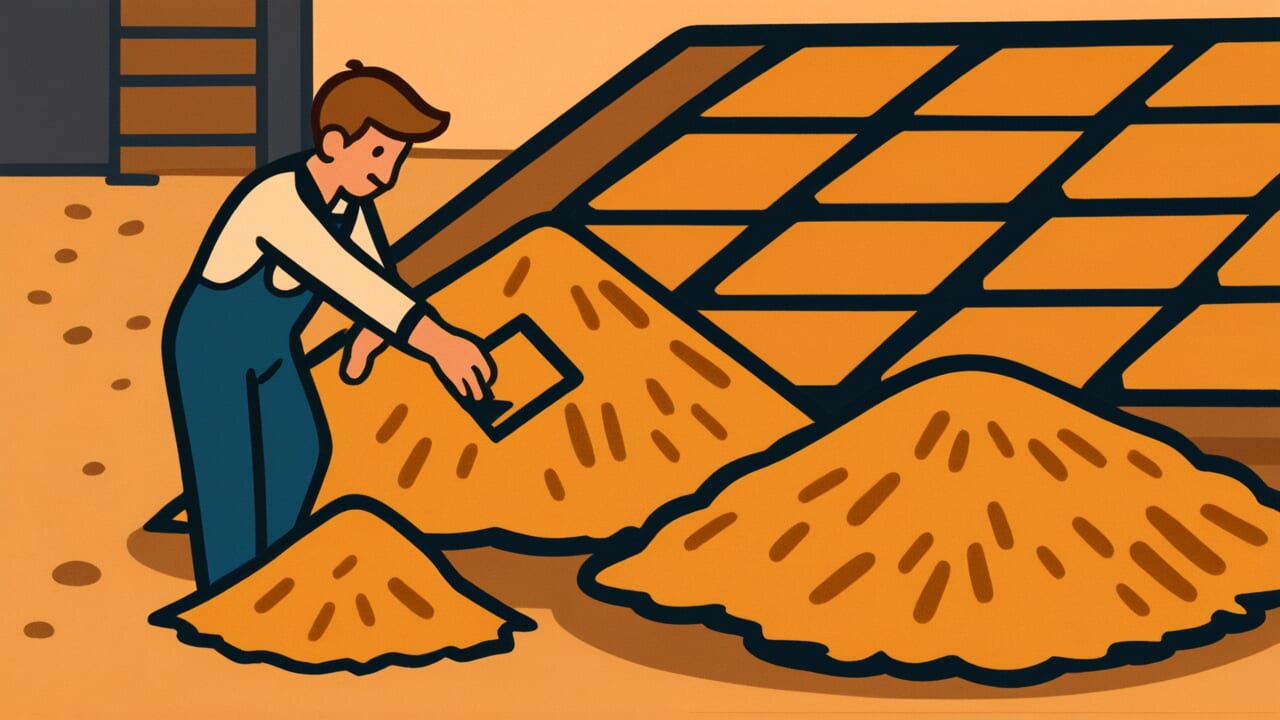How to Read “Even sawdust has its uses”
Ogakuzu mo torie
Meaning of “Even sawdust has its uses”
This proverb means that even seemingly worthless things can serve some purpose. Things that appear to have no value or seem insignificant can always find some use if you change your perspective or think creatively.
People use this saying when someone is about to throw something away because they think it’s useless. It also applies when you might overlook small talents in yourself or others.
Sometimes people quote it when thinking about how to use people or resources that seem unhelpful at first glance.
The reason to use this expression is to remind us not to judge things superficially. We should look at them from multiple angles instead.
Today, efficiency and immediate usefulness are highly valued. But this proverb reminds us to be tolerant and creative. Even things that don’t seem immediately useful deserve our attention.
Origin and Etymology
“Ōgakuzu” refers to wood shavings produced when cutting lumber with a large saw. The ōga was a large vertical saw used since before the Edo period.
It was an essential tool for processing timber into boards. Cutting wood always produces large amounts of shavings. At first glance, these shavings seem like worthless garbage.
However, ōgakuzu was actually used for many purposes. People scattered it on floors for cleaning, used it as bedding for livestock, or burned it as fuel. Nothing went to waste.
In the daily lives of common people during the Edo period, wisdom about not wasting anything was deeply embedded in their culture.
This proverb likely emerged from such practical wisdom. If even seemingly worthless sawdust can be useful with some creativity, then nothing in the world is truly useless.
“Torie” means an advantage or useful quality. “Even sawdust has its uses” expresses the positive outlook of our ancestors. They believed that even the lowest-value items must have some purpose.
Interesting Facts
During the Edo period, sawdust was actually bought and sold as a commodity. High-quality wood shavings had a pleasant fragrance. Restaurants and public bathhouses used them as cleaning supplies to scatter on floors.
Today, compressed sawdust fuel called “oga-light” is being reconsidered as an eco-friendly heating product.
The ōga tool itself is also fascinating. Two people held opposite ends and pulled together in a vertical sawing motion. They had to work in perfect rhythm or the saw wouldn’t cut properly.
Some say the Japanese expression “iki ga au” (to be in sync) came from this cooperative work.
Usage Examples
- Old computers can be used for spare parts, so even sawdust has its uses—it’s wasteful to throw them away
- His work style is modest, but even sawdust has its uses, so there will surely come a time when he proves valuable
Universal Wisdom
The proverb “Even sawdust has its uses” contains deep human wisdom. It teaches us that value is not absolute. Instead, it changes depending on perspective and circumstances.
We humans tend to divide things into “useful” or “useless” categories. But the world isn’t really that simple.
What’s unnecessary today might become essential tomorrow. One person’s trash can be another person’s treasure. This proverb has been passed down for generations because people have always faced this difficulty in judgment.
Looking deeper, this saying also shows a warm view of humanity itself. People who don’t stand out in society, people who can’t produce immediate results, people who seem to have no special qualities—they all have value in their own way.
Don’t easily discard people. Don’t abandon them. Such kindness and hope flow beneath this proverb.
Our ancestors knew the coldness of societies that chase only efficiency. Perhaps that’s why they left us these words.
When AI Hears This
When cutting lumber with an ōga, a certain amount of sawdust is always produced. This is a typical example of “entropy increase” shown by the second law of thermodynamics.
The change from orderly lumber (low entropy state) to scattered sawdust (high entropy state) cannot be avoided according to physical laws.
What’s interesting is quantifying this “cost of disorder.” In wood processing, about 10-15 percent is inevitably lost as waste. This is a physical necessity due to friction heat and blade thickness.
No matter how much technology advances, it can never be completely eliminated. It’s a small manifestation of the law that entropy in the entire universe must always increase.
However, human wisdom found new value in this high-entropy state. By compressing sawdust into fuel, it can be reused as chemical energy. This is “creating local order.”
While disorder continues to increase in the universe as a whole, we can create order in limited places by investing energy. This is exactly the practice of that principle.
This proverb captures the essence of thermodynamics. Even inevitable waste products created by physical laws can be converted into value depending on perspective and energy investment.
Perfect efficiency is impossible, but redefining byproducts is possible.
Lessons for Today
This proverb teaches modern people the importance of flexible thinking. We shouldn’t make snap judgments about the value of things.
Decluttering and minimalism are popular today. That’s exactly why we need the ability to distinguish between truly unnecessary things and things that actually have value.
Around you, there might be things that seem useless at first glance. Old documents, unused tools, people without clear roles. But try changing your perspective a little.
Isn’t there another way to use them? Couldn’t they shine in a different situation?
This applies to yourself too. Your experiences and knowledge that you’re not using right now, your small special skills—they’re never wasted. Someday they will definitely prove useful.
What’s important is not to cut off possibilities in yourself or others just because results don’t come immediately.
Keep a spirit of creativity and ingenuity. That’s the message this proverb gives to those of us living in modern times.



Comments